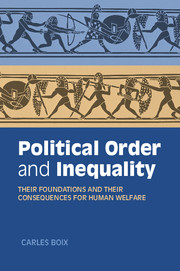1 - Tabula Rasa
Published online by Cambridge University Press: 05 March 2015
Summary
To understand the foundations of political order and the causes of inequality, we must first imagine and examine the social and economic conditions that preceded the introduction of any formal political authority as well as the emergence of any major economic differences across individuals. Accordingly, this chapter models an initial world that has three key traits. First, all individuals are endowed with identical resources. Second, these individuals rely on two different strategies to survive and prosper. They may follow a productive strategy, which consists in the allocation of their resources to the production (and voluntary exchange) of goods and services. Alternatively, they may adopt an expropriatory or predation strategy, that is, they may direct their resources to appropriate the assets or returns of other individuals through the use of force. Third, there are no political institutions or state, that is, there is no organization or set of agents with the monopoly of violence and the capacity to police and punish.
As discussed in the first section of this chapter, under a condition of anarchy all individuals cooperate among themselves and follow a productive strategy provided there is one key condition in place: that all their resources remain similar or, in other words, that there are no substantial changes in the initial condition of equality that characterizes the state of nature. As soon as the distribution of resources and the stream of income each individual receives shifts significantly to the advantage of one section of the population, the outcome of “spontaneous” or “self-enforced” cooperation (as opposed to a world where cooperation is enforced by the state) breaks down. In addition to the level of interpersonal equality, the second section shows that the stability and robustness of an equilibrium of self-enforced cooperation is also shaped by the time horizons, the type of predation technologies available to those individuals, and the mobility of the population. The third section of the chapter offers a broader discussion of the concept and nature of cooperation – and in the process it shows that current alternative explanations of social cooperation (such as risk sharing or production complementarities) are subordinate to the main theoretical claims of this chapter.
- Type
- Chapter
- Information
- Political Order and InequalityTheir Foundations and their Consequences for Human Welfare, pp. 22 - 59Publisher: Cambridge University PressPrint publication year: 2015

